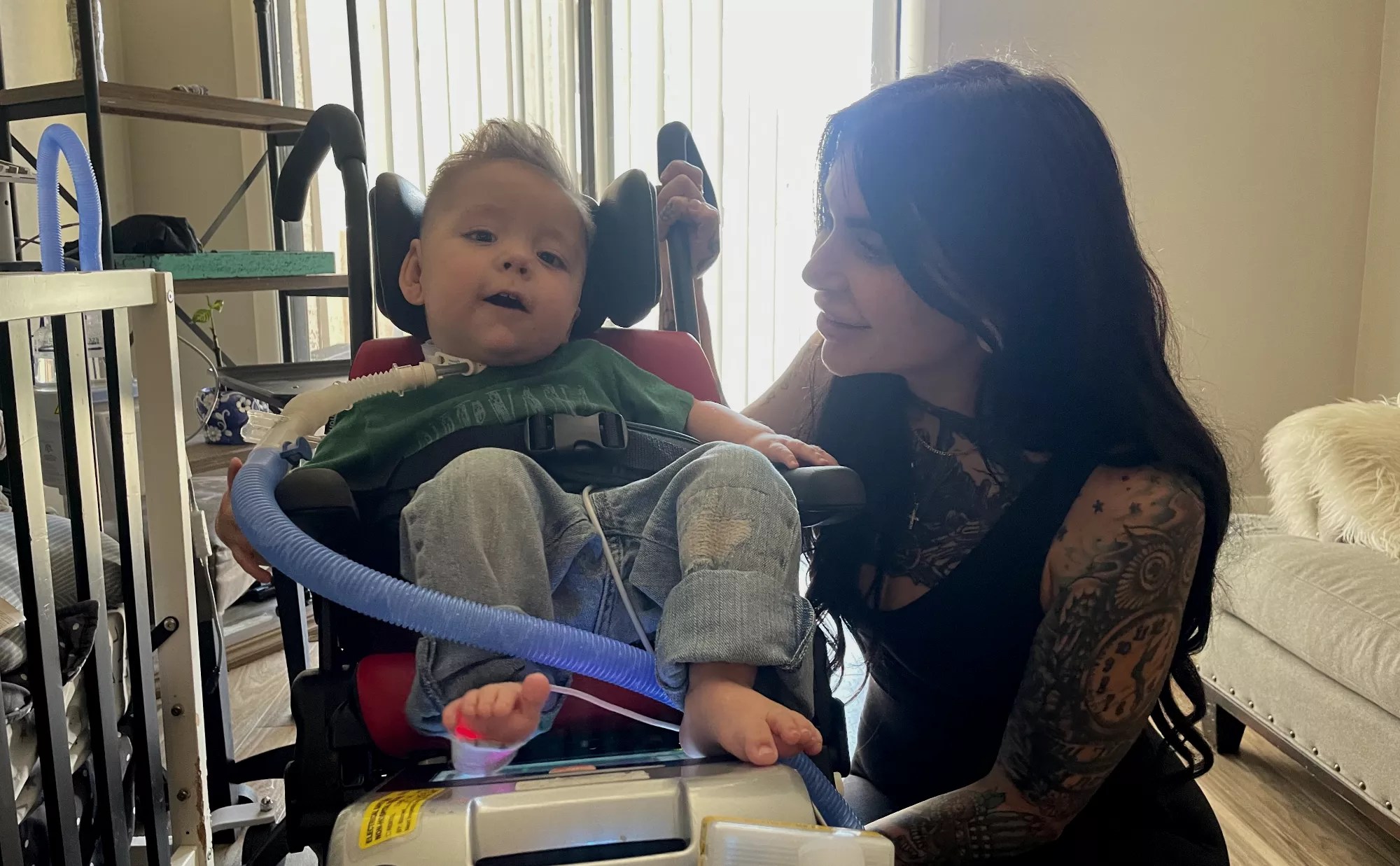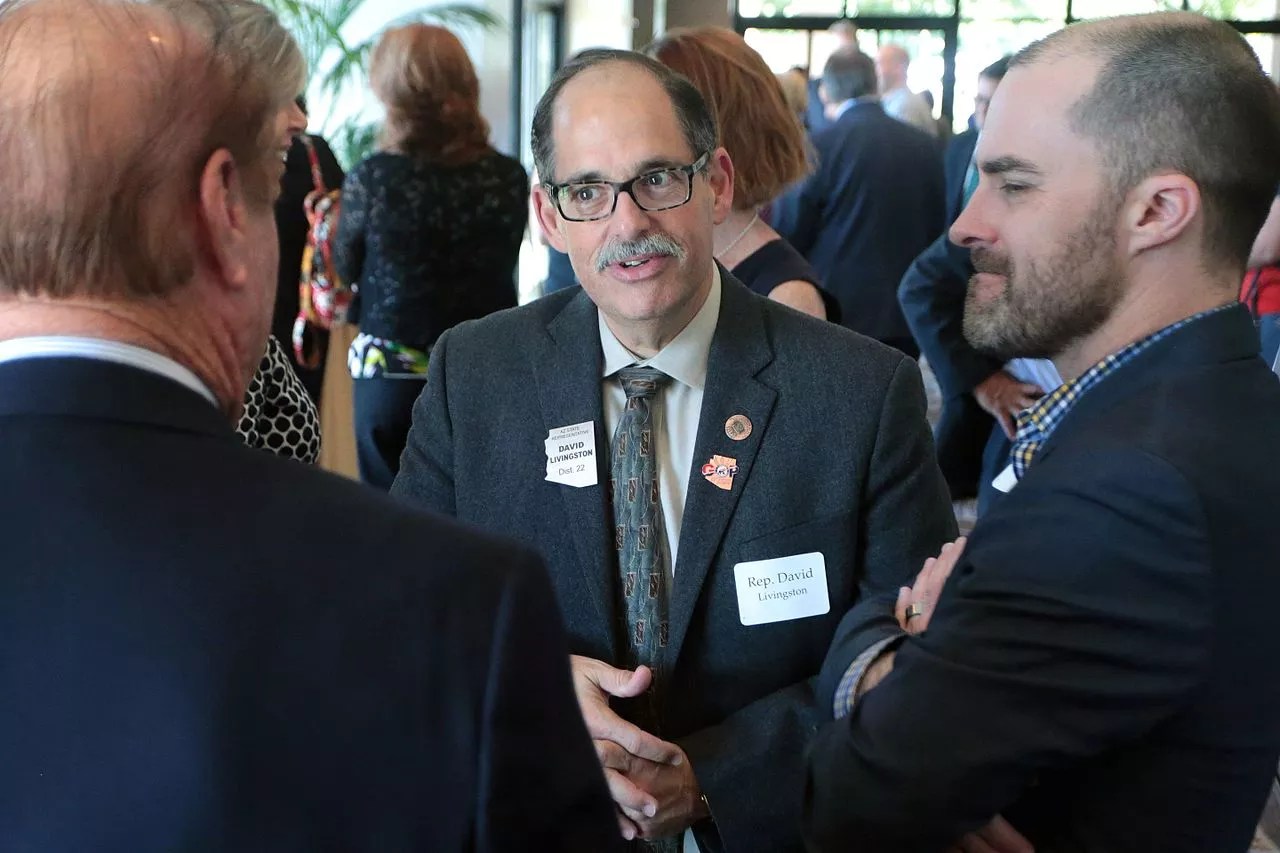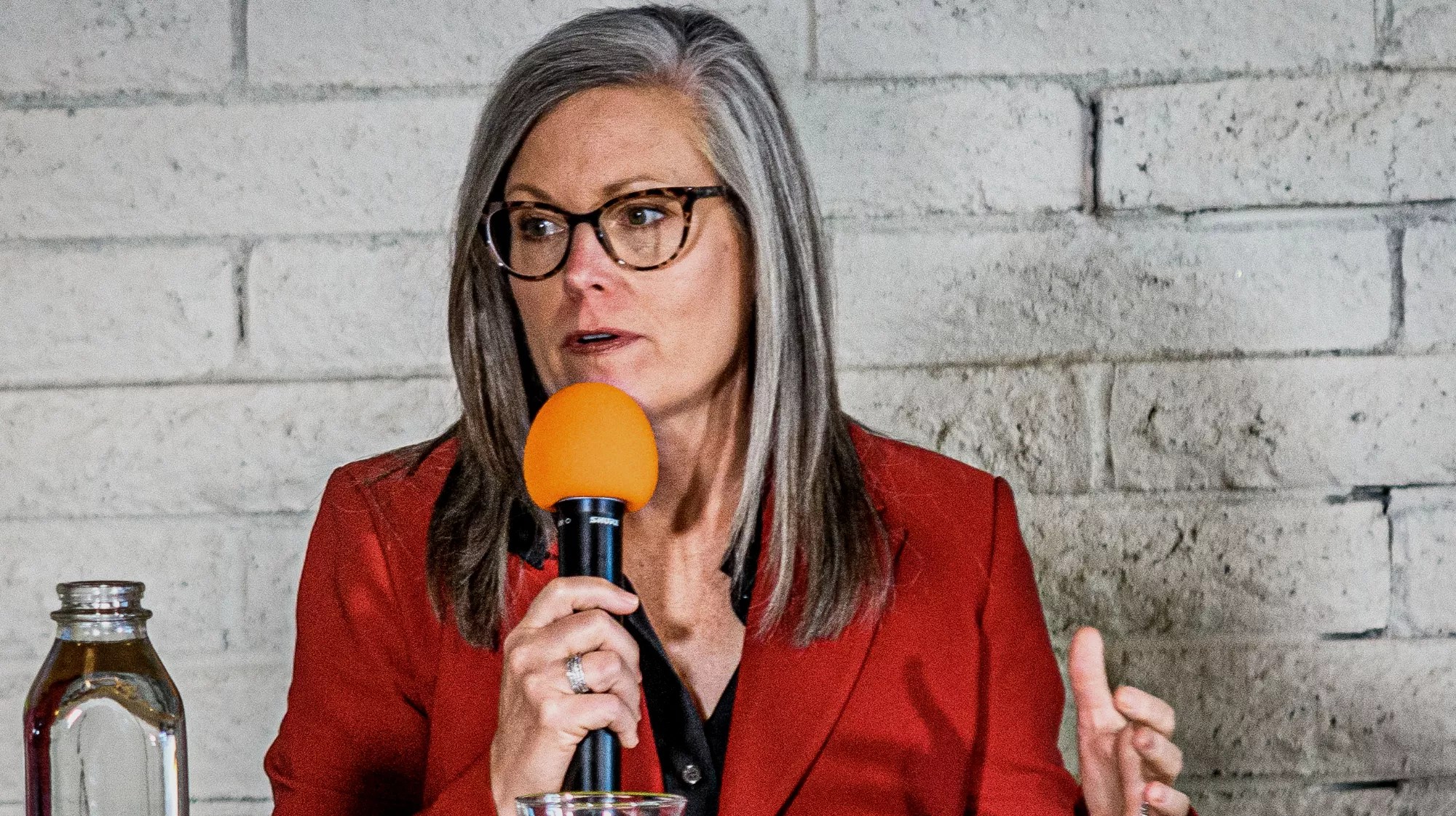
Morgan Fischer

Audio By Carbonatix
They say parenting is a full-time job. For Gilbert resident Alexandra Patterson, that’s no exaggeration.
Her 2-year-old son, Aries, was born with 5Q31.3 deletion syndrome – a condition that is exceedingly rare. He requires a ventilator, oxygen and a gastrojejunal feeding tube in order to live. He has yet to walk or speak and has complicated digestive issues, all of which require 24/7 care.
Since Aries was born in April 2023, Patterson has provided it. An esthetician by trade, Patterson is also a full-time caregiver to Aries. She tracks his oxygen levels and transports him from his crib into his medical chair, ensuring that his ventilator and humidification charger are intact. If his ventilator falls out, Patterson calmly picks up the tube and places it back into a port on her son’s throat.
Patterson and her partner Angel, who also share a 3-year-old son named Zazen, make it work thanks to the Parents as Paid Caregivers program administered by the Arizona Division of Developmental Disabilities. The concept is in the name: Funded for the last several years by federal pandemic relief funds, the program pays parents of children with disabilities for the grinding work of providing the constant care they require.
The program has been a lifeline, but it now appears to be on life support. Federal funding has run out as enrollment in the program has ballooned. Arizona will pick up the slack, with the state paying 35% of its costs, but the initiative now faces a budget shortfall of $122 million. That should be an easy fix – the Arizona Legislature could pass a bill to move some money around. Instead, the program has become a pawn in a political game at the Capitol.
Republican lawmakers have blamed Democratic Gov. Katie Hobbs for allegedly waiting too long to alert them to the funding gap. While Hobbs has pushed for a clean bill to make up the difference, Republican state Rep. David Livingston has pushed for a bill that would fix the budget hole but severely curtail the program’s scope, including cutting the pay parents are eligible to receive in half.
Watching it all play out has been hard for Patterson and many of the other 60,000 families who rely upon the DDD. They are angry and scared, nervous that the program may run out of money by next month. Though Livingston’s bill would avert that crisis, Patterson views its cutbacks on the program as “devastating” and “cruel.”
“Imagine if you were taking a job and your boss just tells you, ‘Hey, I’m gonna cut your pay in half, but the hours are gonna stay the same,'” Patterson told Phoenix New Times. “The workload is gonna stay the same. You’re still gonna be stressed about everything, but you’re gonna get half the pay that you received.”
Tuesday, scores of families who rely on the DDD packed a committee room at the Capitol, some spilling into an overflow room, for the chance to confront lawmakers in person. While several spoke, all got a dispiriting lesson in the dysfunction of Arizona politics as Livingston pulled a craven maneuver to kill a competing – and less draconian – funding bill with bipartisan support.
Before them, lawmakers are playing with their children’s lives, crafting a shit sandwich that Hobbs may eventually have to decide whether to eat. The choice likely will be unappealing: Accept much, much less for families who need the PPCG program to survive, or get nothing at all.

Republican state Rep. David Livingston’s bill would fund the Division of Developmental Disabilities through June, but would impose a host of restrictions on the program in the future.
The blame game
Untangling the how and why of the DDD’s budget crisis might require some Advil. Get ready to rub your temples in consternation.
Hobbs and Republicans have engaged in a pissing contest about the funding shortfall for months. Republicans say Hobbs made what was intended to be a short-term federal program permanent without the legislature’s approval while using the state’s money. They also say Hobbs waited too long to raise the alarm about the massive hole in the DDD budget.
The governor has countered by arguing that she included emergency funding for the DDD in a budget proposal in January and that the legislature routinely passes measures to backfill state programs and departments that are running out of money. (Including, she has pointed out, the largely oversight-free private school voucher program.) She and her communications staff have derided Republicans holding up the funding as “unserious lawmakers” engaging in “a political stunt to disparage” the governor.
Caught up yet? Not quite.
Last week, Livingston finally filed a bill that would fund the DDD, though it came with more strings than a yo-yo factory. House Bill 2945 – and a mirror bill from state Sen. John Kavanagh, Senate Bill 1734 – would allocate $100 million in supplemental funding from the Budget Stabilization Fund. But it would also impose additional oversight on Centers for Medicare & Medicaid Services waivers and reduce PPCG hours by 50% starting in October.
On Tuesday, DDD families and disability advocates packed a hearing room to speak against Livingston’s bill. Nearly 30 people signed up to speak in opposition – though, citing microphone issues, the hearing was moved into a small room that could accommodate only a dozen or so attendees. Everyone else – roughly 40 people in all – had to watch a live-stream of the hearing from an overflow room next door.
It’s standing room only in the Arizona House Appropriations Committee hearing on funding the $122 million Division of Developmental Disabilities’ shortfall.
The meeting was moved into a smaller room. I’m in the overflow room with around 40 other people for @phoenixnewtimes pic.twitter.com/KPQOROJEaF
— Morgan Fischer (@morgfisch) April 15, 2025
The shenanigans started before the hearing did. Just minutes before the hearing, Livingston added three Republican lawmakers to the committee in a naked attempt to block a bipartisan amendment pushed by Republican Rep. Julie Willoughby. The amendment would have struck the 20-hour-per-week cap on paying parent caregivers imposed by Livingston’s bill and boosted the funding allocated for the DDD.
With the committee stacked by Livingston, Willoughby’s amendment failed by a single vote. “Stacking is not right. It’s not the right thing to do,” Republican state Rep. Walt Blackman said during the hearing. Two other amendments – including a Democratic-led strike-everything amendment, which aimed to replace Livingston’s bill with a “clean” supplemental funding bill – also failed.
When parents and advocates were called to speak on the bill, they were blunt. In 90-second increments, they told the 21 lawmakers in the room that Livingston’s proposed cuts to the program would cause only pain. Their children need care, regardless of who’s providing it, and Arizona lacks enough direct care workers to pick up the slack. Halving PPCG payments would just leave parents with the same work and fewer resources. Some told the committee they’d be forced to look at putting their children in group homes or even moving out of state.
Livingston and most other Republicans on the committee weren’t swayed. After a nearly four-and-a-half-hour hearing, Livingston’s bill cleared the committee with only minor technical alterations by an 11-10 vote.
“You all have done a disservice to this community,” Michele Thorne, who is the co-founder and CEO of Care 4 Caregivers and who uses the PPCG program to care for her 12-year-old autistic son. “Shame on you.”

Gov. Katie Hobbs said state Rep. David Livingston’s bill is a “non-starter” for her, at least in its current form.
Kevin Hurley
What happens now
More than parents and Democrats were upset by the committee’s vote.
Republican Rep. Jeff Weninger criticized the Hobbs and some of his fellow Republican lawmakers, saying, “This isn’t the bill to play politics,” before voting against Livingston’s bill. Through tears, Willoughby also voted no, telling families in the room, “I choose you as my hill to die on.” Blackman said legislators needed to “fix this bill,” but he voted in favor anyway.
When Livingston suggested that DDD might end forever without his bill, Republican Rep. Matt Gress – who has been a central advocate for Livingston’s bill and is assistant chairman of the committee – promised parents that “the supplemental will happen.” Republicans want to see this program funded, he said. They just disagree over the guardrails.
In his final statement ahead of the vote, Livingston said that the bill is still a work in progress and urged Hobbs’ team to meet with him.
“The bill is not done. The bill is not close to being done,” he told the room before directing comments at Hobbs. “If you want to do a meeting today. I will be there. If you want to meet tomorrow, I will be there.”
How much the bill may change going forward remains to be seen. It now heads to the House Rules Committee on Wednesday, where advocates will again beg for Republican legislators to listen to them. If it passes there, it would go to the full house for approval. If Kavanagh’s mirror bill clears the same hurdles in the Senate, it would land on Hobbs’ desk.
At least at the moment, Hobbs has signaled she has no interest in signing the bill in its current form. After it passed out of Livingston’s committee, Hobbs criticized Livingston and Gress for engaging in “political theater” with their “unserious proposal.” As is, the bill is “a non-starter for me, for caregivers and for Arizonans with disabilities who rely on Parents as Paid Caregivers,” Hobbs wrote in a statement.
She added that she’s “ready to negotiate with anybody who is ready and willing to discuss a serious funding bill.”
As they wait for lawmakers to sort it out, parents are antsy. Would Hobbs veto a flawed funding bill without an alternative way to keep the program going? Someone, at some point, is going to have to blink.
Damage has already been done, said Brandi Coon, the co-founder of the Raising Voice Coalition, which advocates for the PPCG program.
“We’re already seeing providers leave their jobs because they don’t know if they’re going to be paid in May and June,” said Coon, who relies on PPCG to care for her 10-year-old son with cerebral palsy. “Our kids are currently losing services because all of the nonfamily providers are just leaving the field due to the lack of certainty in this space.”
Even if this crisis is averted, another one looms. Any supplemental budget bill would fund the DDD only from May 1 to June 30. The continued funding of the program past that point will be a part of Hobbs’ budget negotiations with lawmakers for the next fiscal year, a process that involves a lot of horse-trading behind closed doors.
As lawmakers deliberate over those decisions, DDD families must consider their own. For Patterson, the options are unappealing. She does not want to consider removing Aries from her home and placing him in a care facility. She’s already been researching care options in other states, including in California and New Jersey.
Without PPCG, she does not believe she’d be able to find enough care to provide the 24/7 care that her son requires. The state approved 119 nursing hours a week for Aries, but with Arizona short an estimated 30,000 registered nurses, she could only find help for 40 of those hours. Through PPCG, Patterson is paid for an additional 40 hours of care she provides herself. That helps to make ends meet, but it still leaves 39 hours of care – that the state agrees Aries requires – unaccounted for.
If DDD doesn’t get the extra funding or if Livingston’s pay-cutting bill becomes law, that puzzle will become even more difficult to piece together.
“Without DDD, he has to go to a nursing home,” Patterson said. “I don’t have another option than to leave.”